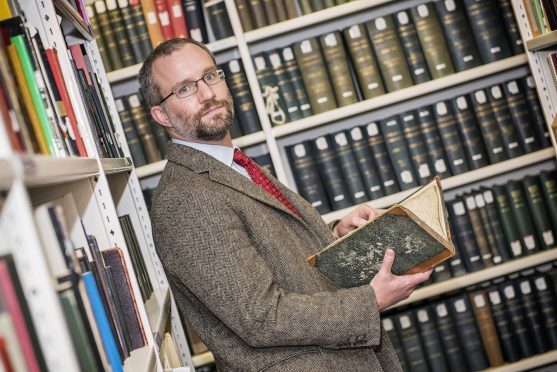Newly-discovered fragments of Aberdeen’s lost mediaeval history have revealed how city forefathers clashed with the Scottish king over his campaign against the Highland chieftans.
Extracts copied from city records lost for more than 200 years have come to light offering an insight into Aberdeen’s relationship with King James 1 of Scotland during the early fifteenth century.
Jackson Armstrong, a history lecturer at Aberdeen University, said finding information about Aberdeen’s royal connections was “extraordinary” and helped piece together a missing part of Scotland’s world class heritage.
The archive of the Aberdeen’s earliest council registers is considered to be a national treasure because it is near complete in its coverage of the period 1398-1511 – with the exception of the missing “third” volume, running from 1414-1434.
Mr Armstrong’s curiosity was pricked by a reference to “very curious extracts from the records of the city of Aberdeen 1398-1658” in a catalogue of the mediaeval holdings of ancient universities and colleges produced in 1932.
When he tracked down the manuscript, by James Man, he found a number of pages had been copied from the missing volume back in the 1700s.
However, the task of transcribing the ancient text proved to be onerous due to the “tortuous handwriting”.
Edda Frankott, editorial research fellow on the Aberden Burgh Records research project, said: “The handwriting was thoroughly frustrating and probably not intended for anyone to see but Man himself.
“However after many painstaking hours I was able to decipher a significant amount of the content and it proved to be well worth the effort.”
Mr Armstrong said that retrieving even a small section of material from the missing volume was “tremendously valuable”.
He added: “We have found information relating to King James I’s journeys by sea to Aberdeen and Inverness.
“We can also see that in 1428, when the king arrested the Highland chiefs at Inverness, he demanded support of men and supply of provisions from Aberdeen.”
However that help does not appear to have been forthcoming as other sources show Aberdeen and three other towns were fined by the crown for failing to contribute fully.
The research team will now continue to work on the sections that have yet to be deciphered which could lead to further revelations.
Deputy council leader, Marie Boulton said it was an “extremely exciting discovery”.
